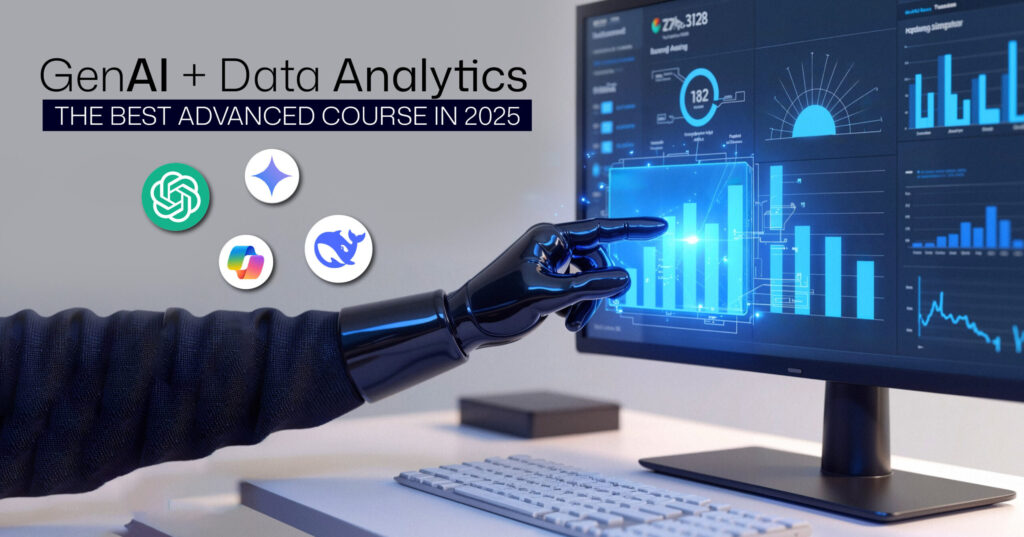If you ask me which is the best advanced course in 2025, I will recommend GenAI + Data Analytics. This blog will give you the best possible insights into why I’m recommending this course. First, let’s dive into one of the most disruptive trends in analytics — the convergence of Generative AI and Data Analytics. GenAI is not just an AI trend anymore; it’s becoming a core part of business intelligence. So, how exactly is GenAI transforming data analytics, and what should professionals learn to stay relevant?
How to understand GenAI in Data Analytics?
Generative AI is referred to as AI architectures (like GPT, DeepSeek, Claude, and Gemini) that can generate human-like text, images or code. In data analytics, it is used to:
- Automate report generation
- Summarize dashboards and datasets
- Generate SQL queries and Python code
- Build predictive models with no-code tools
- Provide natural language-based insights
Key Applications of GenAI in Analytics
- Business Reporting: Tools like Microsoft Copilot, Power BI GPT, and Tableau Pulse can now explain dashboards in plain English.
- Healthcare: GenAI helps analyze clinical notes, generate synthetic medical data, and predict disease progression.
- Agribusiness: Use cases include forecasting crop yields, analyzing satellite data, and recommending optimal sowing dates.
- Retail: From customer sentiment analysis to auto-generating promotion strategies using past sales.
Career Opportunities in GenAI + Data
With businesses rapidly integrating GenAI, new career paths are emerging:
- AI Business Analyst – Uses GenAI to interpret data and drive decisions.
- Data Copilot Specialist – Works with tools like Azure AI and MS Copilot to enhance enterprise BI systems.
- Prompt Engineer for Analytics – Crafts effective prompts to get accurate data summaries or dashboards.
- Generative AI Data Consultant – Helps companies integrate LLMs with their existing analytics workflows.
Skills You Need to Master
Now the ultimate question arises: to master this emerging hybrid domain, where should we focus? Here is the list;
Data Analytics Basics: SQL, Excel, Python, BI tools.
LLM Tools & APIs: OpenAI, Claude, Gemini, LangChain.
Prompt Engineering: Learn how to design questions to get reliable AI outputs.
Cloud Platforms: Azure AI, AWS Bedrock, Google Vertex AI.
Domain Knowledge: Healthcare, Retail, or Agriculture analytics make your skills industry-ready.
Learning Roadmap to Master GenAI in Data Analytics
As the convergence of Generative AI and Data Analytics reshapes business intelligence, professionals need a clear, structured path to upskill effectively. Here’s a five-step roadmap to guide your learning journey:
Step 1: Learn SQL and Python
SQL is used for data extraction, whereas Python is used for data manipulation and analysis. These are key tools for any data analyst, mainly when dealing with structured data and automating processes.
Step 2: Master BI Tools
Must and should have hands-on training with essential BID platforms like Power BI, Tableau, or Looker. Learn the necessary stuff about creating dashboards, visualizations, and reports. Since many tools are now including GenAI capabilities, knowing how to do this is exactly the core.
Step 3: Explore LLM APIs and GenAI Tools
Dive into Generative AI platforms like;
- OpenAI (ChatGPT)
- Google Gemini
- Claude, or open-source models via Hugging Face.
Learn to use their APIs, build small prototypes, and understand how they can enhance data workflows.
Step 4: Practice Prompt Engineering
Develop the skill of crafting effective prompts to extract accurate, insightful responses from GenAI tools. This includes summarizing existing data, drafting the code, and preparing analytics queries using natural language.
Step 5: Build a GenAI-Analytics Project
Apply your knowledge by creating a real-world project, such as an AI-powered report generator or an intelligent dashboard assistant. This will strengthen your portfolio and demonstrate your capability to blend data analytics with GenAI.
With consistent effort and the right guidance, this roadmap can elevate your career in the AI-powered data revolution.
I Would Like to Conclude!
In the year 2025, Generative AI combined with Data Analytics is not merely a trend: it is the very foundation of modern business intelligence. As GenAI gained acceptance in areas like healthcare and retail. Robustly for generating real-time insights, supporting decision-making, and enriching the customer journey. Professionals must upskill to keep up with demand. This hybrid domain demands a solid grasp of analytics tools, programming, LLM APIs, and prompt engineering.
Following a clear learning roadmap—from mastering SQL and Python to building real-world GenAI-powered analytics solutions—can set you apart in a crowded job market. Whether you aim to become an AI Business Analyst, Prompt Engineer, or GenAI Consultant, the opportunities are vast and growing fast. So, if you’re wondering where to start your journey in this cutting-edge field, look no further than Tesk Academy. With expert-led training, hands-on projects, and an industry-aligned curriculum, Tesk Academy is the right place for learning GenAI + Data Analytics. It equips you with not only the skills but also the confidence to thrive in a data-driven future.
What makes Tesk Academy- The best software training institute in India stand out is its practical approach. Rather than focusing just on theory, you’ll work on real-world projects that simulate actual business environments. You’ll also get exposure to the latest AI platforms—like OpenAI, Claude, and Gemini—while mastering top BI tools such as Power BI and Tableau.
As one of the top 5 software training institutes in Hyderabad, it offers flexible, goal-based learning paths depending on whether you are a student, a working professional, or merely seeking a career change. In an era where every business decision is data-oriented, your proficiency in GenAI and analytics will serve as the key to unlocking more intelligent outcomes.

